Let’s Get Honest About HOAs…

Homeowners associations (or HOAs) are supposed to exist to make our lives easier. Don’t want to mow your lawn or deal with noisy neighbors? Typically for a monthly fee, HOAs provide property maintenance and a code of rules meant to provide a uniform look and feel to a community. Sometimes, though, these codes can cause controversy and frustration, such as when an HOA fined a military veteran for displaying an American flag or told a family to take down their daughter’s playground.
Recent studies show Americans still believe homeownership is the key to the American Dream, but even more Americans say the American Dream is tied to freedom of choice in how they live. It can, therefore, feel personal when an HOA says your cherished lawn gnome or jam-packed flower bed is against the rules. But beyond the rules and regulations, how do homeowners really feel about their HOAs? We set out to gauge how much homeowners associations help or hinder neighborhood residents. Surveying over 600 people from various demographics, we asked about the value of HOA fees, the most annoying HOA policies, and the craziest stories from HOA meetings. Read on to see what we found.
Who loves their HOA?
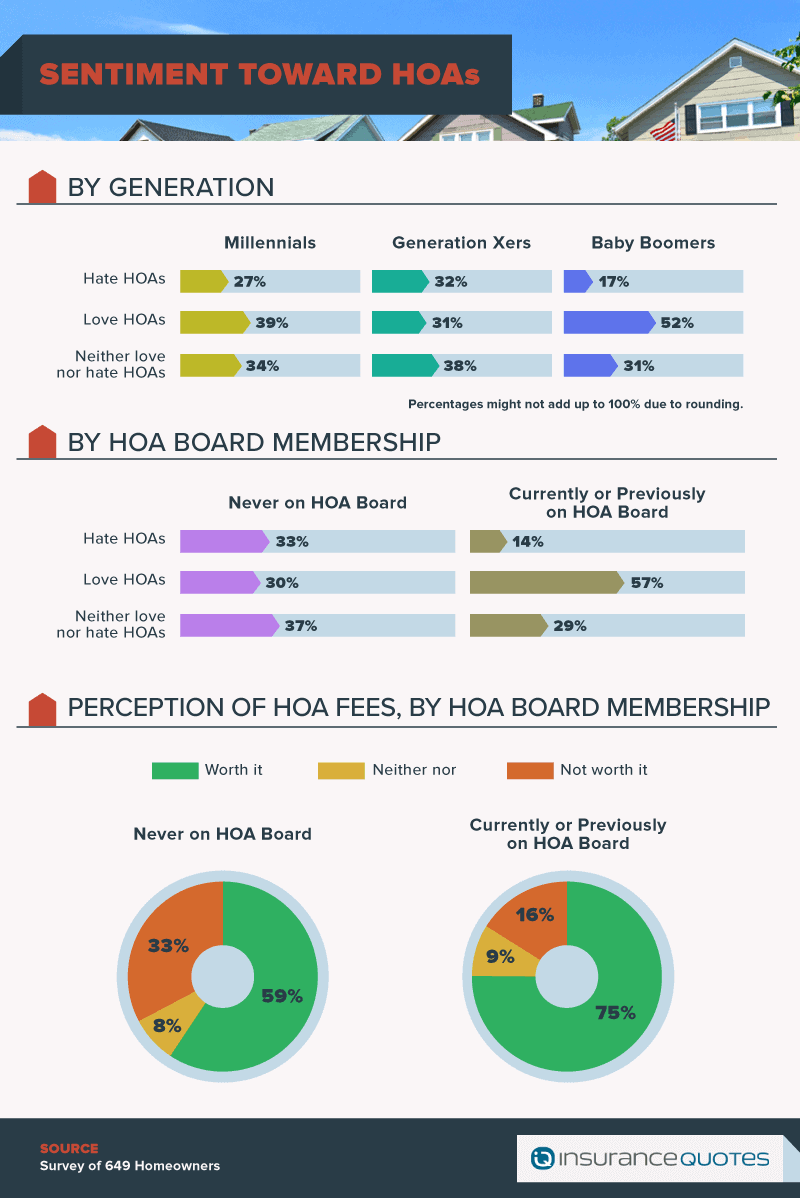
Respondents demonstrated that the way they feel about their HOA depends on their generation. Overwhelmingly, baby boomers were the most likely to say they loved their HOA. As baby boomers reach retirement age, they might be more interested in housing communities that create a peaceful, well-maintained environment. Conversely, Gen Xers were the most likely to hate their HOA.
Beyond the generation gap, respondents’ feelings were affected by whether they had ever served on their homeowners association board. Fifty-seven percent of people who currently or previously served on their HOA board reported loving their HOA, while roughly one-third of people who never served on their board either hated their HOA or had no opinion. Similarly, 75 percent of current and former HOA board members reported their HOA fees were worth it, compared to 59 percent of people who never served on their HOA board.
It seems board membership is key to helping residents see the value in their HOA, perhaps because it gives residents a peek behind the curtain of how community decisions are made. Studies show that most of us don’t like being told what to do, so being a part of the decision-making process might just make the HOA policies more palatable.
What’s all the complaining about?
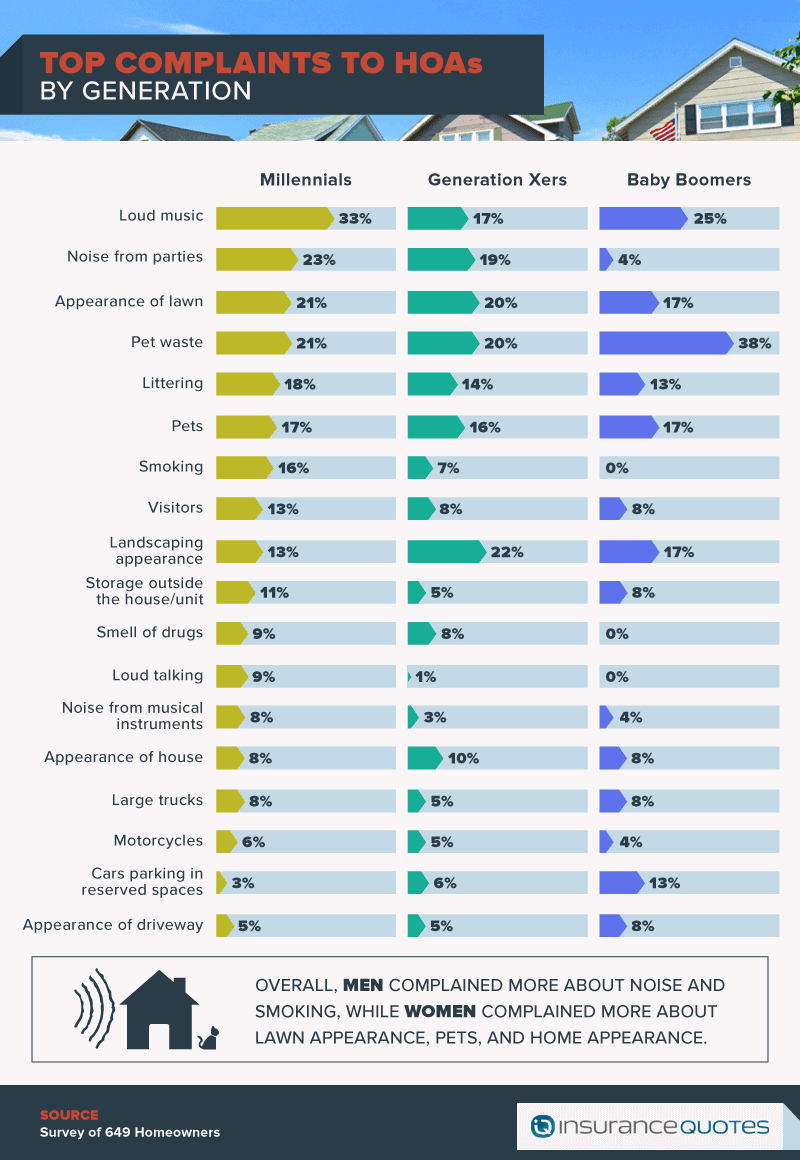
We surveyed homeowners to see what they complained about to their HOA and found more differences based on generation. Millennials were the most likely to complain to their HOA if their neighbors played loud music. This jives with recent data that show millennials make the most sensitive neighbors. Gen Xers were much more concerned with the appearance of landscaping on their neighbors’ properties. Baby boomers, however, seemed to be on poop patrol, as they were overwhelmingly most likely to call their HOA if they found their neighbors’ pet waste in their yards.

Complaints by homeowners varied by gender as well. Men seemed to value their physical comfort in a pollution-free neighborhood since they were the most likely to complain to their homeowners association about loud noise and smoking. Women were more concerned with the aesthetics of their communities and complained to their HOA about their neighbor’s pets as well as the appearance of their lawns and homes.
Attendance at HOA board meetings
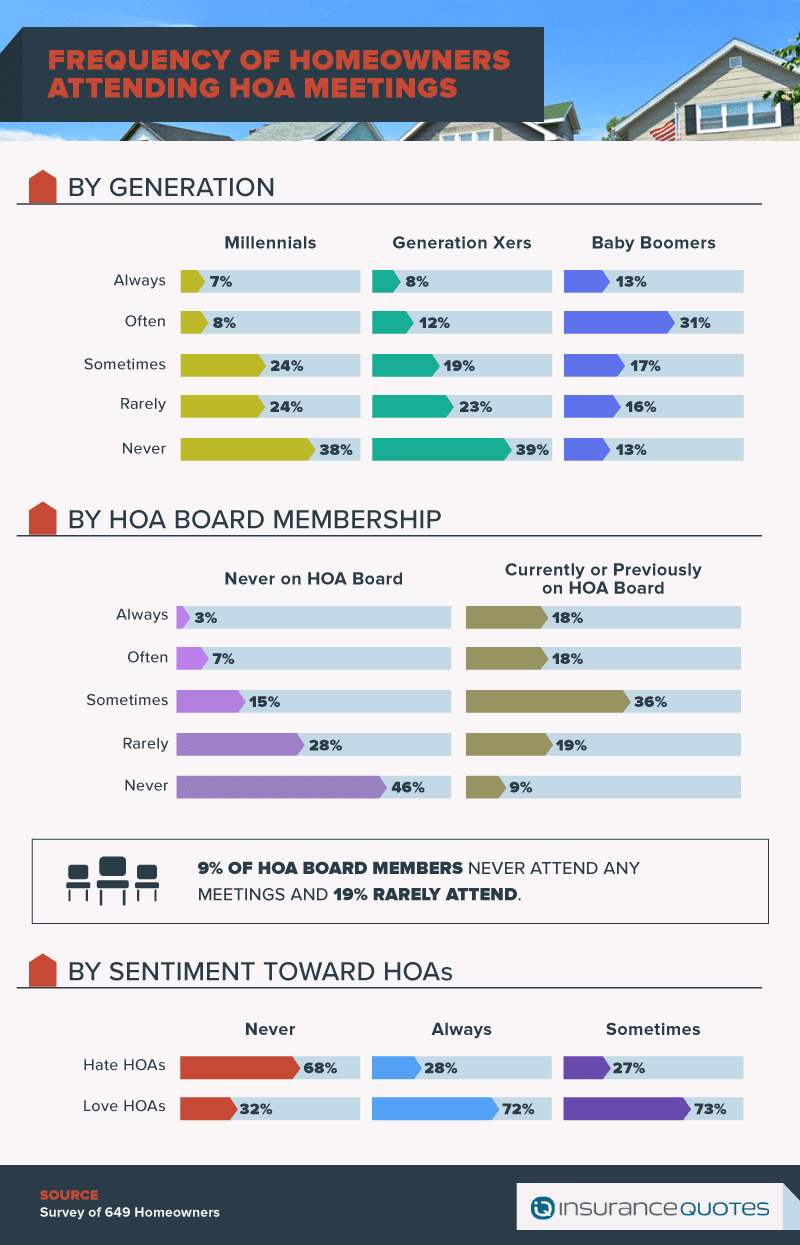
Homeowners associations hold regular board meetings to discuss everything from codes of conduct to yearly budgets, and all residents within the HOA have the right to attend and speak at these meetings.
If you’re concerned about the extra cost of snow plowing this winter or you want the right to paint your shutters turquoise, the HOA meeting is the place to make your voice heard. Unfortunately, our data show most homeowners do not attend all HOA meetings. People who reported being current or previous HOA board members were more likely to attend meetings – but even though board members are responsible for voting on new HOA policies, 9 percent reported never attending HOA meetings and 19 percent rarely attended. Of the homeowners who were never on their HOA board, 74 percent never or rarely attended their HOA meetings.

Homeowners were more than twice as likely never to attend an HOA meeting if they hated their association. On the other hand, roughly 73 percent of residents who said they loved their HOA sometimes or always attended meetings. It stands to reason that if a homeowners association hopes to improve its meeting attendance, it should start by improving its reputation.
To go or not go (to an HOA meeting)
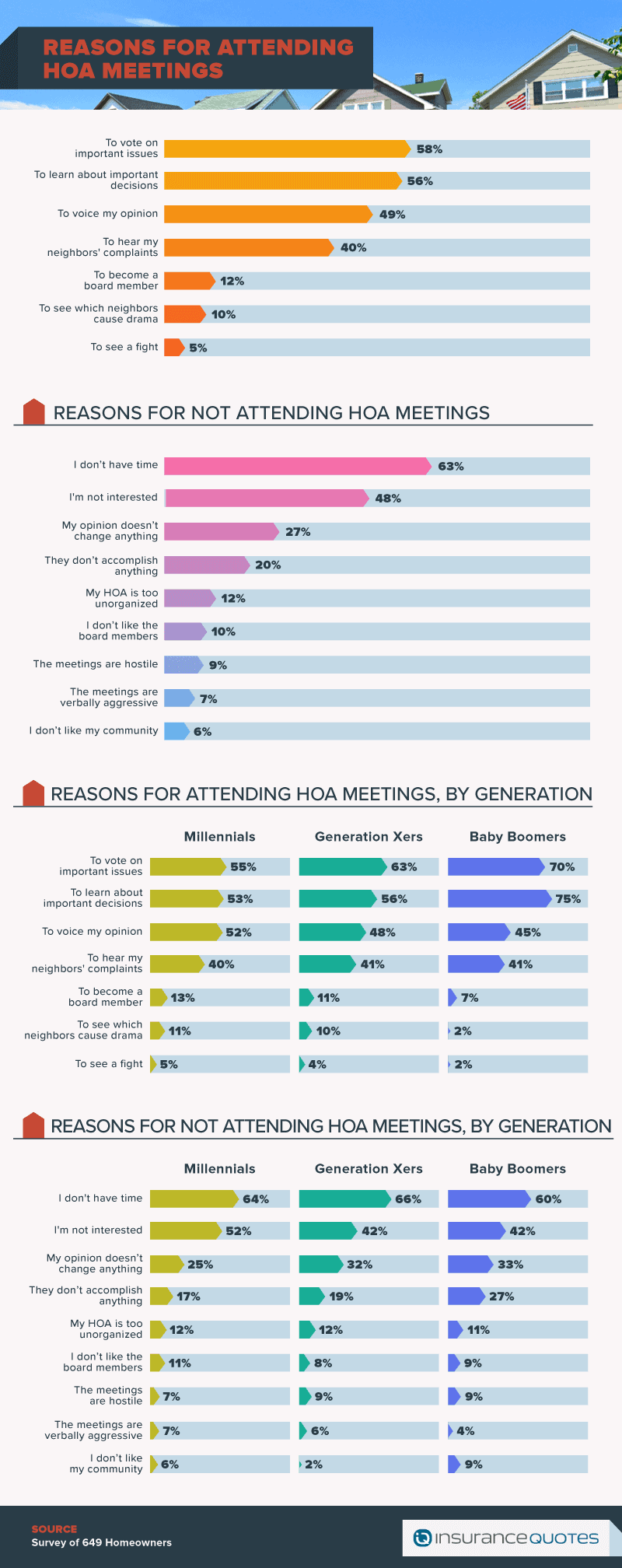

Even more revealing is our data on why people don’t attend HOA meetings. Most homeowners reported stayed away from HOA meetings either due to a lack of time or lack of interest, but many homeowners also felt these meetings were unproductive.
More than a quarter of homeowners felt these meetings were a waste of time because their opinion didn’t affect the decisions of the homeowners association board. Why go to the meeting if the result will be the same as if you stayed home? Among baby boomers, 27 percent avoided HOA meetings because they felt they didn’t accomplish anything. If HOAs were looking to attract more members to their meetings, they would benefit from organized meetings with a clear agenda that create space for members to feel like they’re a part of the decision-making process.
Drama at the HOA meeting
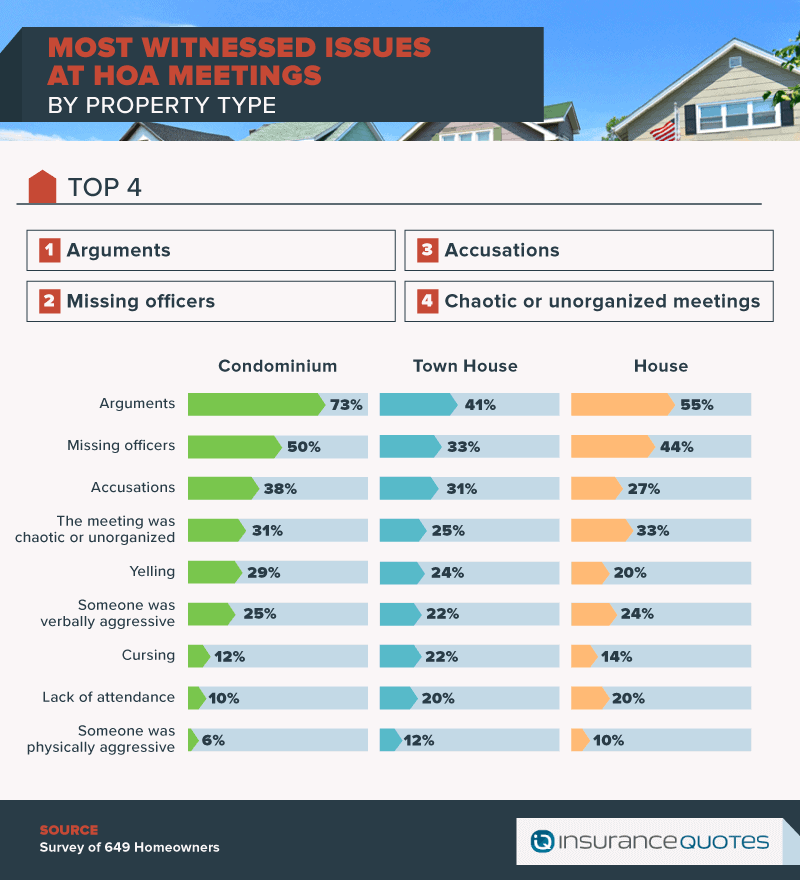
So what actually goes down at these HOA meetings? The majority of homeowners, no matter their property type, reported witnessing arguments at an HOA board meeting. Seventy-three percent of condo owners reported seeing an argument at their meetings. Among town house owners, 12 percent said they saw someone get physically aggressive at an HOA meeting.

Most homeowners reported they had seen HOA officers missing from meetings, but attendance itself didn’t seem to be the biggest problem. Homeowners were more likely to see an argument at a meeting than to see an empty meeting room.
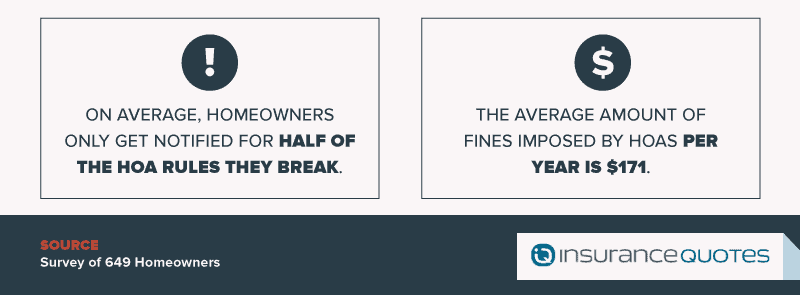
You’ve probably seen news stories that make it sound like homeowners associations nitpick every knickknack and impose impossible fines, but homeowners told a different story about their HOAs. On average, homeowners said they only get notified for half of the rules they broke, with the fines imposed by HOAs averaging $171 per year.
Room for improvement
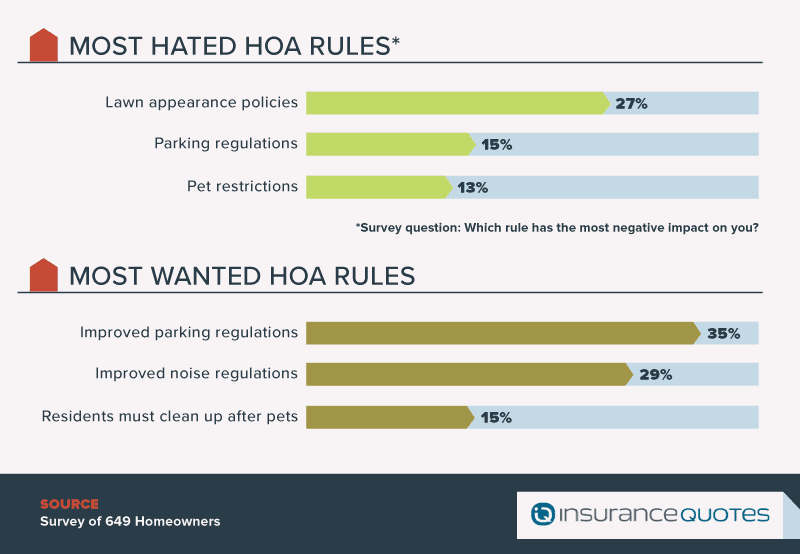
According to a recent study by the Community Associations Institute, 90 percent of homeowners said their association’s rules either had a neutral or positive impact on their community – but not all rules are created equal.
To conclude our survey, we asked people which HOA rules impacted their life most negatively and suggestions on how to improve HOA rules. Respondents said HOA rules governing their lawn appearance had the most negative impact, followed by parking regulations and pet restrictions. It seems the negative impact of parking regulations led some people to seek a better solution: The majority of residents suggested their HOA should improve parking regulations. Other popular suggestions included improving noise regulations and requiring residents to clean up after their pets.
When in doubt, get involved
HOAs are supposed to improve property values by keeping communities aesthetically agreeable for all residents. Most of us can agree that a well-maintained yard makes a property look more appealing, but our opinions might diverge when it comes to the value of a bright purple paint job or 10 inflatable Santas on the front lawn. As long as these opinions diverge, so will our opinions on HOAs, but our data show the best way to get along with your HOA is to get involved. If you feel stifled by your HOA’s policies, your first step should be attending a meeting and making your voice heard.
Unfortunately, you never know what life – or a disgruntled neighbor – might throw your way. To make sure your home and your favorite lawn gnome are covered for the unexpected, start with your free insurance quote today. Visit us at insuranceQuotes.com to learn more.
Methodology
We collected 649 responses from American homeowners using Amazon’s Mechanical Turk. Four-hundred and fifty-four people were never members of an HOA board, 106 stated they were members in the past, and 89 said they were currently on an HOA board. Seventy-one percent of respondents owned a house, 15 percent owned a town house, and 14 percent owned a condominium. Fifty-three percent of respondents identified as women, and 47 percent identified as men. Participants ranged in age from 18 to 82 with an average age of 37.9 and a standard deviation of 11.4. Data were not tested and is exploratory.
Fair Use Statement
Do you want to educate others about HOAs and share these findings? The graphics and information found here are available for noncommercial reuse only. Feel free to share as much as you’d like – just make sure you link back to this page. We promise we won’t impose a fine.
